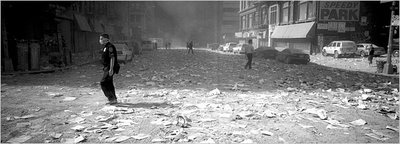
I missed this story on Sunday. The New York Times published a long article on the reason why so many Ground Zero cleanup workers now have lung disease. They didn't use respirators.
One thing that neither the Times article nor the excellent analysis by Confined Space point out is that respirators are safety issues themselves. They make it difficult for workers to communicate with each other. Therefore, employers must be especially vigilant when requiring their use, because workers aren't going to want to use anything that makes it harder to yell "Watch out!" and be heard. The worker recognizes the immediate safety threat of the difficulty in communicating; they don't necessarily assign the long-term threat of lung disease the same priority. Employers care far about the cost of the job than anything else. That's why government agencies, who are aware of the health threat, must be involved in requiring these safety devices. At Ground Zero, the government failed utterly, starting with Christy Todd Whitman, head of EPA, who declared the air around Ground Zero safe to breathe when it was, in actuality, toxic.
Anthony DePalma, NYTimes: Air Masks at Issue in Claims of 9/11 Illnesses
With mounting evidence that exposure to the toxic smoke and ash at ground zero during the nine-month cleanup has made many people sick, attention is now focusing on the role of air-filtering masks, or respirators, that cost less than $50 and could have shielded workers from some of the toxins.
More than 150,000 such masks were distributed and only 40,000 people worked on the pile, but most workers either did not have the masks or did not use them.
[]
From legal documents presented in the case, a tale emerges of heroic but ineffective efforts to protect workers, with botched opportunities, confused policies and contradictions that failed to ensure their safety.
Lawyers representing the workers say that there was no central distribution point for the respirators, no single organization responsible for giving them out, and no one with the power to make sure the respirators that were distributed got used, and used properly.
By contrast, at the Pentagon, workers not wearing proper protective gear were escorted off the site.
Confined Space: World Trade Center Recovery: Dereliction of Duty
The problem began with a statement by then EPA administrator Christie Todd Whitman assuring lower Manhattan workers and residents that the air was safe to breathe. DePalma reports that "the agency's inspector general concluded in 2003 that Ms. Whitman's statement was far too broad and could not be scientifically supported at the time she made it."
Personally, I think DePalma's being a bit too nice. The IG actually found that White House officials instructed the agency to be less alarming and more reassuring to the public in the first few days after the attack than EPA officials originally wanted to be. And earlier this year, Judge Deborah A. Batts of Federal District Court found that Whitman had deliberately mislead the public when she reassured the public after the collapse of the World Trade Centers that the air was safe to breathe in lower Manhattan and Brooklyn. The result of Whitman's lack of concern were devastating for recovery workers, according to Dave Newman of the New York Committee on Occupational Safety and Health who argues that after Whitman's statement, employers "had a green light to say, 'We don't need to use respirators because the E.P.A. says the air is OK.' "
[]
But the real culprit here is the Occupational Safety and Health Administration, the agency tasked by Congress to ensure the health and safety of American workers. And you can look long and hard at the Occupational Safety and Health Act without finding any exception for federally declared disasters:As the magnitude of the recovery operation grew clearer, attempts were made to bring order to the operation. On Sept. 20 the city issued its first safety plan, and it asked the Occupational Safety and Health Administration to take charge of distributing respirators. In what would become a controversial move, OSHA used its discretionary powers to decide not to enforce workplace safety regulations but to act in a supportive role that would not slow down operations.
Previous posts:
9/11 EPA Victims (May 16, 2006)
First Death Officially Linked to 9/11 Clean-Up (April 12, 2006)
Have a Nice Day, Christy Todd Whitman (April 12, 2006)
Liars (April 9, 2006)
Too Bad This Isn't a Criminal Case. Christy Todd Whitman Should Be in Jail. (February 2, 2006)
Republicans to FDNY: Drop Dead (November 15, 2005)
Environmental Protection Agency Also Run By "Inept Political Hacks" (September 11, 2005)
Christy Todd Spineless (March 23, 2005)






No comments:
Post a Comment